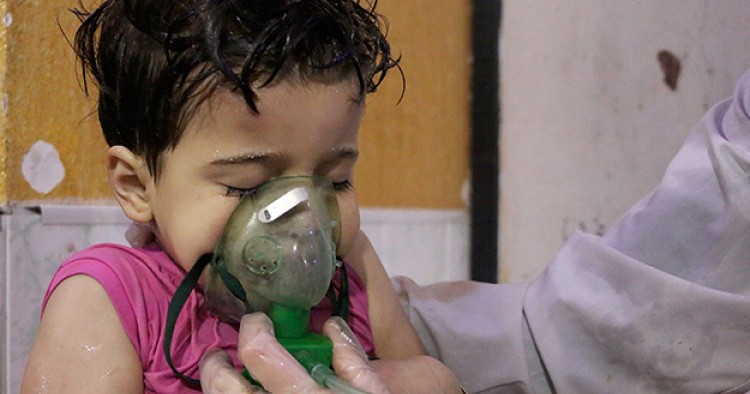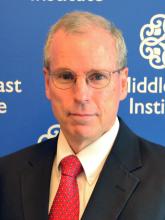In this week's Monday Briefing, MEI experts Robert S. Ford, Gerald Feierstein, Randa Slim, and Alex Vatanka provide analysis on recent and upcoming events including the chemical attack on Douma, Sheikh Tamim's Tuesday meeting with Trump, Lebanese parliamentary elections, Moroccan and Algerian tension over Western Sahara, and Iran and India’s strategic partnership.
Assad’s chemical warfare
Robert S. Ford, Senior Fellow
The Saturday chemical weapons attack in the eastern Damascus suburb of Douma was only the latest of numerous such attacks since the U.S.’s April 2017 strike aimed at deterring the Syrian government from using chemical weapons. One-time strikes, even big ones, are inadequate to deter the Syrian government, which is accustomed to carefully testing limits and escalating when responses are weak.
Another big U.S. strike, perhaps with France’s or other states’ participation, would make big news for a few days, but the Syrian government, with its shortage of manpower, has an incentive to keep using chemical weapons unless deterred. Unless the Trump administration inflicts significant military cost after each instance of Syrian government use of chemical weapons, the government of Bashar Assad will have little incentive to change its long-standing military tactics, including chemical weapons use.
This would not be an easy policy to implement. U.S. intelligence about the Syrian battlefield is not perfect. Also, there are no obvious international legal justifications for the strikes. And while Russia may not welcome Assad’s use of chemical weapons, Moscow’s policy in Syria seeks above all to secure the existing Syrian government’s firm grip on power. U.S. strikes that seriously jeopardize the emerging reconsolidation of Assad’s authority could trigger a Russian response. Over the longer term, the strikes would not ensure a political resolution to the civil war, meaning that Assad will stay in power and the cruelty of his military campaign to reconquer Syria will not stop. The best that the Americans can realistically hope to do is to steadily deter the regime’s use of chemical weapons in that brutal campaign.
Sheikh Tamim visits the White House
Gerald Feierstein, Director of Gulf Affairs and Government Relations
Sheikh Tamim bin Hamad Al Thani will meet with President Donald Trump at the White House on Tuesday. Sheikh Tamim’s visit to the U.S. mirrors a similar foray by Saudi Crown Prince Mohammed bin Salman in March. Discussions with the administration will feature the U.S. role in promoting a resolution of the ongoing dispute within the Gulf Cooperation Council that has pitted Qatar against Saudi Arabia, the United Arab Emirates, Bahrain and Egypt (also known as the quartet). U.S.-Qatari cooperation in counterterrorism will also be on the agenda, as the Qataris scramble to ensure that the U.S. is satisfied in an area that is at the center of the Saudi-Emirati bill of particulars against Doha. Sheikh Tamim will also promote U.S.-Qatari private sector cooperation.
Saudi Arabia and the UAE anticipate that the new U.S. foreign policy team of John Bolton and Mike Pompeo will be more supportive of their anti-Qatar position than were the outgoing Rex Tillerson and H.R. McMaster. So far, there have been no clear signs of a shift in the U.S. desire to negotiate a resolution of the dispute, as President Trump made clear in his phone calls to Gulf leaders last week. Although the personalities at the top of the U.S. foreign policy hierarchy may change, U.S. interests in preserving the GCC and resolving its internal disputes remain.
But Saudi announcements on the eve of Sheikh Tamim’s visit to the U.S. make clear that the quartet is not ready to abandon the anti-Qatar campaign. Suggestions that the Saudis, with Emirati support, will carve a canal along the Saudi-Qatari border and position military bases and a nuclear waste dump there highlight that even if Saudi policy is not carved in stone, its effort to isolate Qatar will at least be carved in sand.
Lebanon at a crossroads
Randa Slim, Director of the Initiative for Track II Dialogues
Lebanon secured aid pledges exceeding $11 billion at a donor conference held last week in Paris. The pledges include a renewal of a $1 billion credit line from Saudi Arabia, a signal that the Saudi leadership is changing its February 2016 stance of conditioning its financial support to Lebanese institutions on Hezbollah ending its involvement in Syria and Yemen. These pledges of aid are as much intended to support the Lebanese economy as to enable the Lebanese government to continue hosting the more than 1 million Syrian refugees in Lebanon. The millions of dollars that are slated for public infrastructure projects will create jobs for both Lebanese citizens and Syrian refugees.
The conference comes at a critical time in Lebanese politics as the country prepares to hold parliamentary elections on May 6. Prime Minister Saad Hariri is hoping the conference outcomes will boost his election prospects. Unlike in 2009, when Lebanon held its last parliamentary elections, Hariri’s voter base is suffering from a case of buyer’s remorse. In 2009, Hariri and his allies secured their win riding a wave of popular anger, especially among Lebanese Sunnis, in reaction to Hezbollah’s military takeover of Beirut in May 2008. This time, Hariri is no longer pivoting his campaign on the issue of Hezbollah’s weapons. Hariri’s governance record is less than stellar. Lebanon is facing a looming economic disaster, and has recently been ranked as the most corrupt Arab country. A government led by Hariri has failed at delivering basic services including safe waste management and steady electricity and water supplies. Moreover, Hariri and the rest of the old March 14 camp are facing a slate of new candidates mostly hailing from civil society whose electoral platforms appeal to the former’s voter base.
Western Sahara simmers again
Gerald Feierstein, Director of Gulf Affairs and Government Relations
The government of Morocco has filed a complaint with the U.N. Security Council alleging that the Polisario Front has infiltrated parts of Western Sahara in an effort to establish an independent state in the no man’s land of eastern Western Sahara. The focus of Moroccan concerns is the northeastern town of Mahbes. Morocco maintains that Polisario’s incursion represents a violation of the 1991 military agreement that established a buffer zone between the Moroccan-built berm bisecting Western Sahara and Morocco’s border with Algeria and Mauritania. The Moroccans consider the violation to be a “casus belli.”
The incident has sharply increased tensions between Morocco and Algeria. According to news reports, Morocco sent a message to the Algerian government through an unidentified European ambassador demanding that Polisario personnel withdraw from the buffer zone. But the Algerians rejected the Moroccan demand, according to reports, responding that Algeria “does not consider itself a stakeholder” in the dispute.
In addition to its complaint to the Security Council, Morocco dispatched Foreign Minister Nasser Bourita to Paris and Washington to seek the support of the two governments considered most sympathetic to Morocco’s position on the long-running Western Sahara dispute. Sources report that the French government expressed firm support for the Moroccan position. Washington’s views were less clear, complicated undoubtedly by Tillerson’s departure and H.R. McMaster’s last week as national security advisor. Following Bourita’s meeting with Acting Secretary of State John Sullivan, the Department of State issued a statement expressing the U.S.’s “commitment to U.N.-led efforts to find a peaceful, sustainable, and mutually acceptable political solution to the long-standing dispute over the Western Sahara.” The Moroccans will almost certainly find the statement disappointing.
Iran and India’s new partnership
Alex Vatanka, Senior Fellow
Iran and India have long pledged to form a strategic partnership. It has been a rocky process but it is dragging forward. Both the energy sector and the collaborative development of Iran’s deep-sea port of Chabahar, which would give India land access to Afghanistan and Central Asia, have been at the forefront of the efforts. Iran's oil minister is to visit Delhi next week and India might finally be given the right to develop Farzad B, a gas field discovered by an Indian consortium in 2008. Disagreement over commercial terms has kept the project in limbo.
The upcoming visit follows Iranian Prime Minister Hassan Rouhani’s visit to India in February. In Delhi, Rouhani also awarded an agreement to India for the management of part of the Chabahar port.
Rouhani took longer than anticipated to make the visit. By comparison, he visited China as one of his first major international trips in May 2014. Prime Minister Narendra Modi visited Tehran in May 2016. So why did it take this long for Rouhani to arrive in India? In one word: mistrust. Tehran has had a troubled relationship with Delhi since at least 2005, when India decided to move closer to the U.S. India’s rapidly expanding ties with Israel were also a factor. Meanwhile, Iran’s refusal to give Indian energy companies the kind of contracts they were after upset the Indians so much that they cut back on Iranian oil imports in retaliation.
However, Iran is now giving India big discounts; Indian oil imports from Iran are to be doubled over the next year. The Iranians have clearly decided that further delay in developing the Farzad B and Chabahar projects is unwarranted. Not only is India a huge energy market but its diplomatic clout on the international stage can only grow. And Iran can use as many markets and friends it can find.
The Middle East Institute (MEI) is an independent, non-partisan, non-for-profit, educational organization. It does not engage in advocacy and its scholars’ opinions are their own. MEI welcomes financial donations, but retains sole editorial control over its work and its publications reflect only the authors’ views. For a listing of MEI donors, please click here.

















